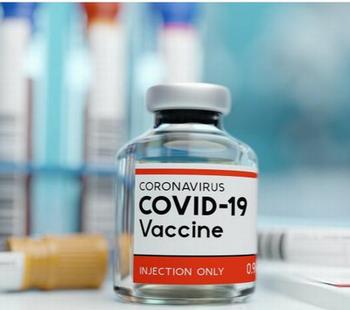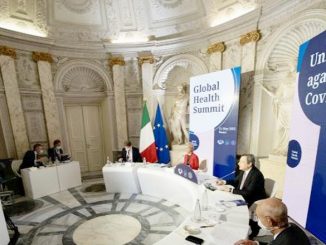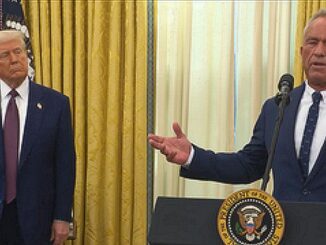
CAMBRIDGE, Massachusetts, November 16, 2020 (ENS) – Moderna, a Massachusetts biotechnology company pioneering therapeutics and vaccines, today announced that its COVID-19 vaccine candidate, mRNA-1273, has been rated 94.5 percent effective by the U.S. government.
World-famous public health Dr. Anthony Fauci, who heads the National Institute of Allergy and Infectious Diseases, NIAID, at the National Institutes of Health, hailed the announcement of this second successful coronavirus vaccine calling it “truly outstanding,” as U.S. caseloads spiked at record levels.
To date, there have been 11.2 million cases of COVID-19 diagnosed in the United States with 246,000 deaths. Worldwide, there have been 54.8 million cases with 1.32 million deaths.

Moderna explains that medicines made of messenger ribonucleic acid, or mRNA for short, “are sets of instructions that cells in the body use to make proteins to prevent or fight disease.”
Moderna’s study, a Phase 3 vaccine efficacy trial, is known as the COVE study. More than 30,000 participants at 100 clinical research sites in the United States are participating in the study, which launched on July 27, 2020, after results from earlier stage clinical testing indicated that the vaccine candidate is well-tolerated and immunogenic.
Recognizing the disproportionate impact of the epidemic on underrepresented minority populations, investigators worked with community engagement partners to enroll a diverse pool of participants, so 37 percent of trial volunteers are from racial and ethnic minorities.
The first interim analysis included 95 participants with confirmed cases of COVID-19.
The study is being conducted in collaboration with the National Institute of Allergy and Infectious Diseases, which is part of the National Institutes of Health; and the Biomedical Advanced Research and Development Authority, part of the Office of the Assistant Secretary for Preparedness and Response at the U.S. Department of Health and Human Services.
“This is a pivotal moment in the development of our COVID-19 vaccine candidate. Since early January, we have chased this virus with the intent to protect as many people around the world as possible. All along, we have known that each day matters. This positive interim analysis from our Phase 3 study has given us the first clinical validation that our vaccine can prevent COVID-19 disease, including severe disease, percent said Moderna CEO Stéphane Bancel.

Based on the interim safety and efficacy data, Moderna intends to request an Emergency Use Authorization, EUA, from the U.S. Food and Drug Administration in the coming weeks. Currently, mRNA-1273 is not approved for use by any regulatory body.”We look forward to the next milestones of submitting for an EUA in the U.S., and regulatory filings in countries around the world, while we continue to collect data on the safety and efficacy of the vaccine in the COVE study,” said Bancel. “We remain committed to and focused on doing our part to help end the COVID-19 pandemic.”
One advantage the Moderna vaccine candidate has over the vaccine candidate announced by Pfizer earlier this month is that Moderna’s mRNA-1273 remains stable at 2° to 8°C (36° to 46°F), the temperature of a standard home or medical refrigerator, for 30 days.
At -20° C (-4°F) mRNA-1273 can remain stable for six months, at refrigerated conditions for up to 30 days and at room temperature for up to 12 hours.
While rated 90 percent effective in preventing COVID-19, the Pfizer vaccine candidate must be kept at nearly minus 100 degrees Fahrenheit to remain effective. Pfizer’s specially designed shipping boxes, packed with special dry ice and containing between 1,000 and 5,000 vaccine doses each, can only be opened twice a day for less than three minutes at a time while maintaining temperature standards.
The Moderna vaccine candidate doesn’t need that cold a temperature to remain effective.
“We believe that our investments in mRNA delivery technology and manufacturing process development will allow us to store and ship our COVID-19 vaccine candidate at temperatures commonly found in readily available pharmaceutical freezers and refrigerators,” said Juan Andres, chief technical operations and quality officer at Moderna.
“We are pleased to submit these extended stability conditions for mRNA-1273 to regulators for approval. The ability to store our vaccine for up to six months at -20° C including up to 30 days at normal refrigerator conditions after thawing is an important development and would enable simpler distribution and more flexibility to facilitate wider-scale vaccination in the United States and other parts of the world,” Andres said.
Moderna has now announced that further progress towards ensuring the distribution, storage and handling of the vaccine can be done using existing infrastructure.
The Biomedical Advanced Research and Development Authority, part of the U.S. Health & Human Services Department is supporting the continued research and development of mRNA-1273 with $955 million in federal funding. BARDA is reimbursing Moderna for 100 percent of the allowable costs incurred by the company for conducting the program.
The U.S. government has agreed to provide up to $1.525 billion to purchase supplies of mRNA-1273 under a U.S. Department of Defense contract, with an option to buy 400m more.
The new funding, combined with up to $955 million previously committed, more than doubles the U.S. government’s investment in Moderna to potentially $2.48 billion.
Moderna is working with the U.S. Centers for Disease Control and Prevention, Operation Warp Speed and McKesson, a COVID-19 vaccine distributor contracted by the U.S. government, as well as global stakeholders to be prepared for the distribution of mRNA-1273, in the event that it receives an EUA and similar global authorizations.
Japan, Canada, Switzerland, Qatar and Israel have also signed purchase agreements, and the European Commission has a “potential purchase agreement” for at least 80 million doses, “The Guardian” reports.
By the end of 2020, the company expects to have about 20 million doses of mRNA-1273 ready to ship in the United States, and Moderna says the company remains on track to manufacture 500 million to one billion doses globally in 2021.
Copyright Environment News Service (ENS) 2020. All rights reserved.
© 2020, Environment News Service. All rights reserved. Content may be quoted only with proper attribution and a direct link to the original article. Full reproduction is prohibited.



